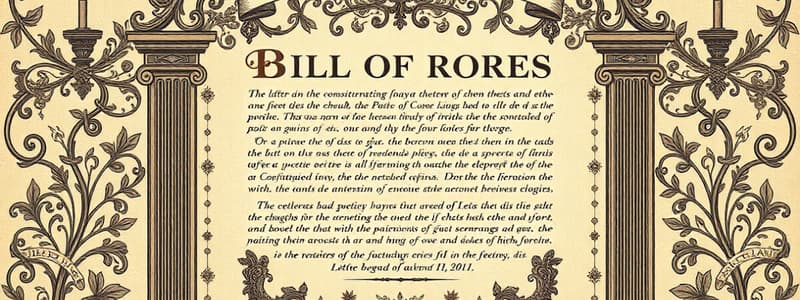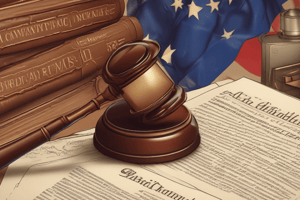Podcast
Questions and Answers
What is the purpose of the Bill of Rights in the Philippine Constitution?
What is the purpose of the Bill of Rights in the Philippine Constitution?
- To provide guidelines for the economic policies of the state.
- To enumerate the responsibilities of the government.
- To outline fundamental rights and freedoms guaranteed to citizens. (correct)
- To establish a national religion for all citizens.
Which of the following best describes procedural due process?
Which of the following best describes procedural due process?
- It guarantees the right to a trial by jury in all cases.
- It protects individuals from unjust laws regardless of procedure.
- It allows the government to act swiftly without formal procedures.
- It ensures fair procedures before depriving individuals of life, liberty, or property. (correct)
Which statement correctly reflects substantive due process?
Which statement correctly reflects substantive due process?
- It ensures that laws are enforced without procedural fairness.
- It protects against laws that are unjust, regardless of their application. (correct)
- It focuses solely on the speed of legal proceedings.
- It provides a mechanism for legal representation in all cases.
What is meant by 'Equal Protection of the Laws'?
What is meant by 'Equal Protection of the Laws'?
Which of the following is considered a fundamental right under the Constitution?
Which of the following is considered a fundamental right under the Constitution?
What is the primary purpose of the Bill of Rights in relation to arbitrary actions?
What is the primary purpose of the Bill of Rights in relation to arbitrary actions?
What does 'unreasonable searches and seizures' protect individuals from?
What does 'unreasonable searches and seizures' protect individuals from?
Which of the following best defines the principle of Equal Protection?
Which of the following best defines the principle of Equal Protection?
How are civil liberties crucial in a democratic society?
How are civil liberties crucial in a democratic society?
What does the term 'Arbitrary Classification' refer to in legal contexts?
What does the term 'Arbitrary Classification' refer to in legal contexts?
Which of the following is true about the rights protected under the Bill of Rights?
Which of the following is true about the rights protected under the Bill of Rights?
What is required for a warrant to be issued according to the definition of Probable Cause?
What is required for a warrant to be issued according to the definition of Probable Cause?
What does the Exclusionary Rule state regarding evidence obtained during unlawful searches?
What does the Exclusionary Rule state regarding evidence obtained during unlawful searches?
Under what circumstance may laws differentiate between individuals or groups?
Under what circumstance may laws differentiate between individuals or groups?
Which of these best describes the requirement of Particularity in warrants?
Which of these best describes the requirement of Particularity in warrants?
What does Judicial Oversight ensure in the context of warrants?
What does Judicial Oversight ensure in the context of warrants?
Study Notes
Bill of Rights
- Ensures individual liberties and prevents state abuses.
- Protects freedom of speech, due process, and safeguard against unreasonable searches and seizures.
Due Process of Law
- Ensures fair and just legal proceedings.
- Prevents arbitrary state actions.
Procedural Due Process
- Requires fair procedures before state deprives life, liberty, or property.
- Involves notification of proceedings, fair trial, legal representation, and opportunity to present a case.
Substantive Due Process
- Protects individuals from unjust laws, even if procedures are followed.
- Ensures laws are reasonable and fair in nature.
Equal Protection of the Laws
- Guarantees equal treatment under the law regardless of status, race, or identity.
- Prevents discrimination without justification.
Fundamental Rights
- Protected by the Constitution.
- Include right to life, liberty, property, free speech, and assembly.
- Essential for human dignity and functioning democracy.
Unreasonable Searches and Seizures
- Protects individual privacy and security.
- Prevents government from searching or seizing property without proper legal authorization.
Civil Liberties
- Protect individuals from government interference.
- Include freedom of speech, privacy, and fair trial.
- Promote democratic society, justice, and equality.
Arbitrary Actions
- Actions based on personal whim, not established laws or fairness.
- Bill of Rights protects citizens from such actions.
Rule of Law
- All individuals and institutions, including government, are subject to laws.
- Laws govern nation, not arbitrary decisions.
Equal Protection
- Requires equal treatment under the law.
- Prevents unjust discrimination.
Non-Discrimination
- Prohibits laws that favor or discriminate based on arbitrary classifications.
Reasonable and Justifiable Distinction
- Laws can distinguish between individuals based on relevant, legitimate criteria.
Fairness
- Impartial treatment under the legal system, without bias.
Arbitrary Classification
- Grouping people based on unreasonable criteria, leading to unequal treatment.
Right to Security
- Protection from arbitrary intrusion by the state.
Unreasonable Searches and Seizures
- Prohibits searches and seizures lacking legal justification.
Warrant Requirement
- Legal order needed for searches and arrests, based on probable cause and issued by a judge.
Probable Cause
- Sufficient reason to believe a crime occurred, needed for a warrant.
Judicial Oversight
- Independent review and approval of warrants by a judge.
Exclusionary Rule
- Evidence obtained unlawfully is inadmissible in court.
Particularity Requirement
- Warrants must describe the place to be searched and items to be seized to prevent overly broad searches.
Plain View Doctrine
- Exception to warrant requirement, allowing seizure of evidence in plain view.
Studying That Suits You
Use AI to generate personalized quizzes and flashcards to suit your learning preferences.
Description
Test your knowledge on the Bill of Rights and key concepts related to due process of law. This quiz covers essential protections of individual liberties, fair legal proceedings, and equal protection principles that uphold democratic values. Explore the fundamental rights guaranteed by the Constitution.




